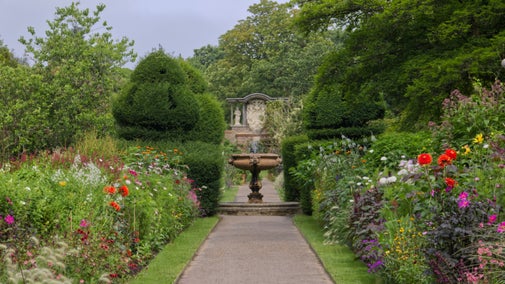
Discover more at Tintinhull Garden
Find out when Tintinhull Garden is open, how to get here, the things to see and do and more.

Explore the history of Tintinhull Garden, one of the most harmonious gardens in Britain. Created last century around an attractive 17th-century manor house, it is the work of two 20th-century gardeners; one an untrained amateur whose name is largely unknown and the other one of the UK’s most distinguished garden writers and designers. Learn more about the vision of these two women.
The garden was created around a Grade I-listed 17th-century house, which is visible from every part of the garden. The garden layout was planned with an eye to those looking out from the house (now a National Trust holiday cottage).
The strong design of the garden was the work of Phyllis Reiss, who with her husband bought Tintinhull in 1933 and left it to the National Trust after her death in 1961. She was a shy woman, born into a vanished world of leisured prosperity.
Influenced by gardens such as Hidcote in Gloucestershire and her travels throughout France and Italy, she was part of a circle of gardeners that included the renowned Vita Sackville-West, who created her own garden at Sissinghurst.

Reiss took a painterly approach to her garden, aiming for impact and emotional effect. She took ideas from famed garden designer Gertrude Jekyll, but simplified the herbaceous planting and planned imaginative and bold colour schemes. The garden is deceptively disciplined, with a strict formal framework offset with much looser floriferous planting. Reiss also included architectural plants for added interest.
Reiss intended her ‘happy garden’ to be a place of peace and tranquillity, especially so after the creation of the Pool Garden in memory of her nephew who was killed in the Second World War.
Twenty years after Reiss’ death, Penelope Hobhouse took on the tenancy at Tintinhull with her husband Professor Malins. It was while living here that Hobhouse developed her ideas on colour and became an internationally renowned garden designer and writer. Many of her books reference her work at Tintinhull, where she used pots to dramatic effect and maintained Reiss’ experimental spirit.

Today, there are seven distinct areas, all with different characters. From the challenge of planting in dry shade under magnificent trees to the creative pleasure of bringing colours together to harmonise and contrast, the garden was planned for year-round interest.
After more than 50 years in the care of the National Trust, Tintinhull is a garden with dramatic impact, but also a haven of quiet calm.
The quiet house at Tintinhull Garden is now let as holiday accommodation. Find out more about how you can stay at Tintinhull House.

Find out when Tintinhull Garden is open, how to get here, the things to see and do and more.
Find out about making a group booking at Tintinhull Garden, or combining it with a visit to other National Trust places nearby in South Somerset if you’d like to make a day of it.

Discover more about the history of the plants, gardens and landscapes in our care.

Learn about people from the past, discover remarkable works of art and brush up on your knowledge of architecture and gardens.
